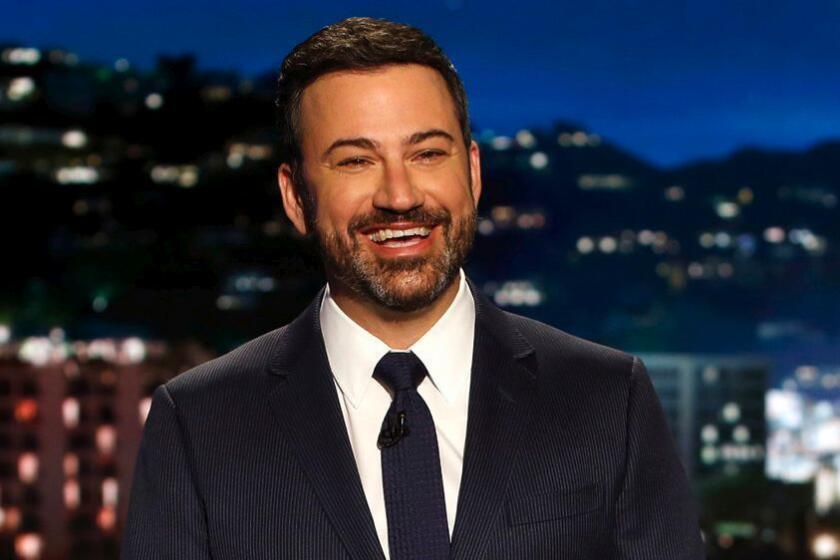Column: What Jimmy Kimmel’s lame apology for blackface reveals about the comedy world
- Share via
You gotta hand it to Jimmy Kimmel. It’s tough to position yourself as a progressive social warrior while apologizing for your repeated use of blackface, but he did his level best.
Recently criticized by many, on the right and the left, for “blacked up” impersonations of various celebrities on “The Man Show” in the late ’90s and early ’00s, the ABC late-night host finally broke his silence on Tuesday. After a very defensive preface — “I have long been reluctant to address this, as I knew doing so would be celebrated as a victory by those who equate apologies with weakness and cheer for leaders who use prejudice to divide us” — he offered an apology to a strikingly specific group: “those who were genuinely hurt or offended by the makeup I wore or the words I spoke.”
All in all, it was tough to separate the regret from the subtext.
Clearly, Kimmel believes much of the criticism comes from people motivated not so much by their outrage over blackface as by their desire to undercut his continued condemnation of the Trump administration and positions taken by the far right.
He is not wrong about that — conservatives, including Donald Trump Jr., have recently pointed to Kimmel as the epitome of the double standard that decries racism, including past use of blackface, by Republicans but gives liberals, like Virginia Gov. Ralph Northam, a pass.
But for Kimmel to express frustration “that these thoughtless moments have become a weapon used by some to diminish my criticisms of social and other injustices” doesn’t help his case.
At all.
The host of “Jimmy Kimmel Live” says he needs some time off, and he’s calling on “a cavalcade of very kind and capable people” to fill in for him over the summer.
If you’re going to apologize for using blackface, apologize for using blackface. Don’t call it a “thoughtless moment” because, dude, you wrote the sketches, you rehearsed the sketches and you sat in the chair while someone put brown makeup all over you more than once.
Then — the fallout from Ted Danson’s infamous blackface appearance at a 1993 Friars Club roast of Whoopi Goldberg notwithstanding — you apparently looked in the mirror and thought, “Yeah, you know, this will be hilarious.”
So: not thoughtless moments. Several considered and very bad choices.
Choices that Kimmel was far from alone in making. A few weeks ago, Jimmy Fallon apologized for his use of blackface, and even as Kimmel was addressing his past, cocreators Tina Fey and Robert Carlock requested that several episodes of “30 Rock,” in which various actors appeared in blackface, be pulled from streaming libraries. (Fey is also under fire for the depiction of Asians in her film “Mean Girls” and for her series “Unbreakable Kimmy Schmidt,” which features Jane Krakowski, who is white, as a main character revealed to be Native American.)
Many people better versed in the rise of minstrel shows and blackface than I am have recently reminded the general public that, historically, the sole purpose of white people blacking their faces was to cloak racist mockery in the guise of general entertainment.
In case anyone needed reminding.
In a furious, unfunny 27-minute set posted to the Netflix Is a Joke YouTube page, Dave Chappelle traces a path from slavery to the death of George Floyd.
Kimmel, Fallon, Fey and other white entertainers who have used blackface as entertainment say that racist mockery was not their intent but, frankly, that’s as tough a sell as “My Confederate flag only represents my regional pride.”
Blackface isn’t funny. Not only because it can never overcome its origins but also because it just isn’t humorous. Impersonations can be funny, and many white comedians impersonate famous Black people without resorting to blackface. But when a white person goes to the length to paint him or herself a different color to impersonate — or, as Megyn Kelly absurdly implied in her job-ending defense of blackface Halloween costumes, honor — a Black person, the underlying message is: “I am so essentially different from this person that I cannot possible convey who they are without the paint.”
Also, “Isn’t it funny to think of me being Black?”
There are times when, as in the case of “30 Rock” or “Tropic Thunder,” blackface is used as a way of calling out white privilege and/or cultural appropriation, but that is a perilous road best avoided; as Fey recently said, intent is not an excuse.
Intent is also tricky and way too difficult to parse in a mass-audience film or television show, especially with something as blatantly racist as blackface; the first, most visible layer of intent when using blackface is the affirmation of it as an acceptable form of entertainment.
(Oh, and let’s please not get distracted in any way by “White Chicks” and its use of whiteface. Whiteface is not, nor has ever been a means of oppression. It’s not even really a thing.)
What I really don’t understand is why Kimmel or Fallon or even Fey waited to be called out. They each have a perfect opportunity to lead by example. If this culture is going to finally acknowledge the many layers of racism — and sexism and classism — upon which it rests, the excavation will reveal mistakes numerous enough to go all the way around. A few hundred times.
As his more recent work shows, Kimmel clearly wants to be part of the solution. But it would be more helpful if, instead of assuming the defensive posture, he had gotten in front of the story and taken a few minutes to explain, honestly, what he was thinking when he decided to use a comedy “technique” that had been roundly denounced for years. Maybe, instead of worrying about whether his apology would be taken for “weakness,” he could have had a public discussion with the subjects of his impersonations.
I mean that seriously. Apologies are good; conversations that actually move cultural understanding and antiracism forward are better.
More to Read
The biggest entertainment stories
Get our big stories about Hollywood, film, television, music, arts, culture and more right in your inbox as soon as they publish.
You may occasionally receive promotional content from the Los Angeles Times.












